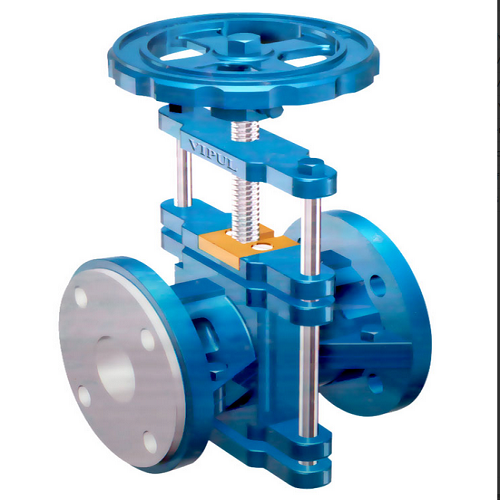
our category
PINCH VALVE
Pinch Valve: An Overview
A pinch valve is a type of control valve used to regulate the flow of fluids, primarily in applications where the fluid is either slurry, granular, or a mixture of liquids and solids. Pinch valves are designed with a unique mechanism that controls the flow by pinching or compressing the flow path, usually a flexible tube or hose, to open or close the passage. This makes them especially suitable for handling abrasive, viscous, or corrosive materials.
Enquire Now
Key Features of Pinch Valves:
- Flexible Hose: The central feature of a pinch valve is the flexible rubber or elastomeric hose through which the fluid flows. This hose is pinched closed to stop the flow and released to allow fluid passage.
- Simple Design: Pinch valves are relatively simple in construction, typically consisting of a valve body, the pinch element (such as a rubber sleeve), and a mechanism for applying pressure to pinch the sleeve.
- Minimal Contact with Fluid: Since the fluid only comes into contact with the flexible hose, pinch valves are ideal for applications that involve hazardous or contaminated materials. This helps minimize wear and tear on the valve’s internal components.
- Actuation Types: Pinch valves can be operated manually or automatically. In automated systems, pinch valves may use pneumatic, hydraulic, or electric actuators to control the opening and closing of the valve.
How Pinch Valves Work:
The operation of a pinch valve is straightforward. When the valve is activated, the flexible tube or sleeve is compressed, either manually or through an actuator, which restricts or stops the flow of fluid. Conversely, when the valve is opened, the tube expands, allowing fluid to flow freely through the valve.
Common Applications:
- Slurry and Abrasive Flow: Pinch valves are commonly used in industries like mining, sewage treatment, food processing, and pharmaceuticals, where they handle slurries, solids-laden fluids, or corrosive substances.
- Bulk Material Handling: These valves are often found in systems that transport or process bulk solids such as grains, powders, and chemicals.
- Water Treatment Plants: Pinch valves are used to control the flow of water and chemicals in water treatment applications.
- Pneumatic Conveying Systems: In pneumatic conveying systems, pinch valves are used to regulate the flow of materials through pipes without contamination.
- Food and Beverage Industry: Pinch valves are used to control the flow of liquids, powders, and other materials in food production lines, ensuring hygiene and ease of maintenance.
Advantages:
- Cost-Effective: Pinch valves are typically more affordable compared to other types of valves, especially for applications involving abrasive or corrosive materials.
- No Internal Moving Parts: Since the valve’s operation is based on pinching a flexible hose, there are fewer parts that can wear down, making pinch valves highly reliable and low-maintenance.
- Accurate Flow Control: The pinch mechanism allows for fine control of the flow, which is essential in applications that require precise regulation.
- Ability to Handle Slurries and Solids: Unlike other types of valves that can clog when handling solid or viscous fluids, pinch valves excel in managing such challenging substances.
- Versatility: Pinch valves can be used in a wide range of industries and applications, making them versatile for controlling different types of materials, from liquids to solids.
Disadvantages:
- Limited Pressure Handling: Pinch valves are typically best suited for low to medium pressure applications. High-pressure operations may require a different type of valve for better performance.
- Wear on Rubber Sleeves: The flexible sleeve or hose may degrade over time due to constant pinching and exposure to harsh materials, necessitating periodic replacement.
- Not Ideal for High-Temperature Fluids: Pinch valves may not perform well with extremely high-temperature fluids, especially if the rubber material is not rated for such conditions.
Conclusion:
Pinch valves are a simple yet highly effective solution for controlling the flow of slurry, viscous, or abrasive materials. Their flexibility, low maintenance, and ability to handle tough materials make them indispensable in industries like mining, wastewater treatment, and food processing. While they may have limitations in high-pressure or high-temperature scenarios, their ease of use and reliable performance in appropriate conditions make them a popular choice for fluid and bulk material handling systems.
